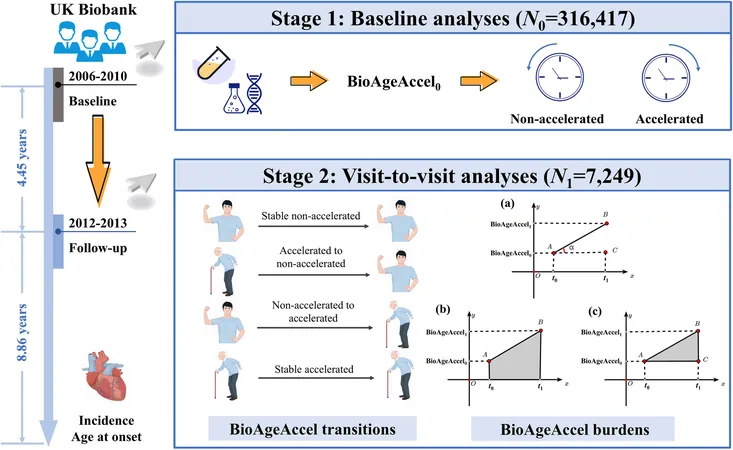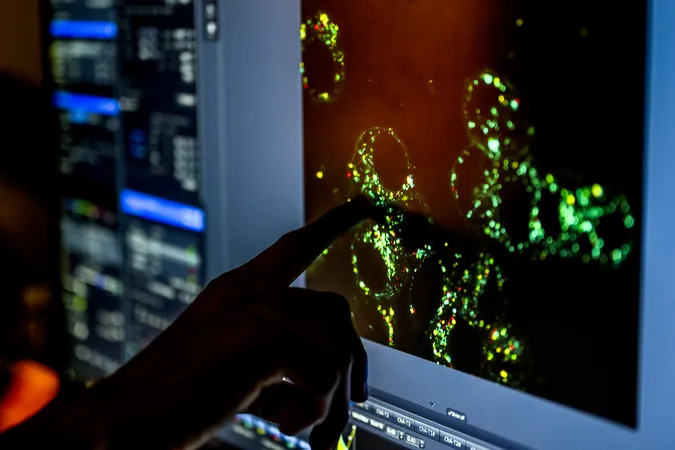
The Hidden Link Between Accelerated Aging and Heart Disease: Shocking New Study Reveals All!
2025-07-01
Author: Wei Ling
Understanding the Rise of Heart Disease
Heart disease continues to wreak havoc worldwide, claiming lives and leaving a massive footprint on global health. Despite a significant 43% reduction in the age-standardized mortality rate from 1980 to 2021, cardiovascular disease (CVD) has become alarmingly prevalent in younger populations. The unique relationship between biological aging and the onset of heart disease raises crucial questions.
What is Biological Aging?
Biological aging varies significantly among individuals. While chronological age ticks away uniformly, biological age changes at different rates for each person. This discrepancy helps us understand why some individuals may face severe aging-related symptoms much earlier in life.
Revolutionary Biomarkers of Aging
Recent advancements have yielded various biomarkers—like DNA methylation age and telomere length—that measure biological aging and its implications for heart health. However, previous research primarily focused on single measurements, failing to capture the dynamic, cumulative nature of aging.
Can We Reverse Biological Aging?
Emerging research suggests biological aging may not be as set in stone as once thought. A recent trial demonstrated that healthy men aged 50-72 experienced an average reduction of over three years in their biological age through lifestyle modifications in just two months! This opens the door to exciting possibilities regarding heart health.
The Potential Threat of BioAgeAccel
BioAgeAccel, which considers both biological and chronological ages, is gaining traction as a critical predictor of CVD risk. But what happens when we look beyond the baseline markers? Understanding the burdens associated with varying levels of biological age acceleration could provide invaluable insights into the risk of developing heart disease.
A Comprehensive Study of Over 300,000 Participants
Utilizing the vast UK Biobank data, a recent study assessed 316,417 participants, along with a subset who underwent follow-ups. The meticulous analysis tracked changes in BioAgeAccel and sought to uncover how these transitions affect the risk of developing heart issues.
Groundbreaking Findings on BioAgeAccel and CVD Risk
The research linked higher instances of CVD to accelerated biological aging. Those maintaining accelerated aging were at a staggering 65% higher risk, while reverting to non-accelerated aging equated to a significant reduction in risk! These findings could revolutionize preventative measures in cardiovascular health.
BioAgeAccel Burdens vs. Traditional Risk Scores: Who Wins?
When comparing the impacts of BioAgeAccel to traditional risk scores like the Framingham and SCORE2, BioAgeAccel burdens proved more influential in predicting CVD risk. This revelation highlights the necessity of integrating biological aging metrics into cardiovascular assessments.
A Beacon of Hope for Heart Health
This study suggests that addressing biological aging could provide a fresh angle on preventing heart disease. Increasing awareness of modifying factors may empower individuals to take control of their health. As we learn to harness these biological insights, we may just find the key to reducing the alarming rates of heart disease.



 Brasil (PT)
Brasil (PT)
 Canada (EN)
Canada (EN)
 Chile (ES)
Chile (ES)
 Česko (CS)
Česko (CS)
 대한민국 (KO)
대한민국 (KO)
 España (ES)
España (ES)
 France (FR)
France (FR)
 Hong Kong (EN)
Hong Kong (EN)
 Italia (IT)
Italia (IT)
 日本 (JA)
日本 (JA)
 Magyarország (HU)
Magyarország (HU)
 Norge (NO)
Norge (NO)
 Polska (PL)
Polska (PL)
 Schweiz (DE)
Schweiz (DE)
 Singapore (EN)
Singapore (EN)
 Sverige (SV)
Sverige (SV)
 Suomi (FI)
Suomi (FI)
 Türkiye (TR)
Türkiye (TR)
 الإمارات العربية المتحدة (AR)
الإمارات العربية المتحدة (AR)